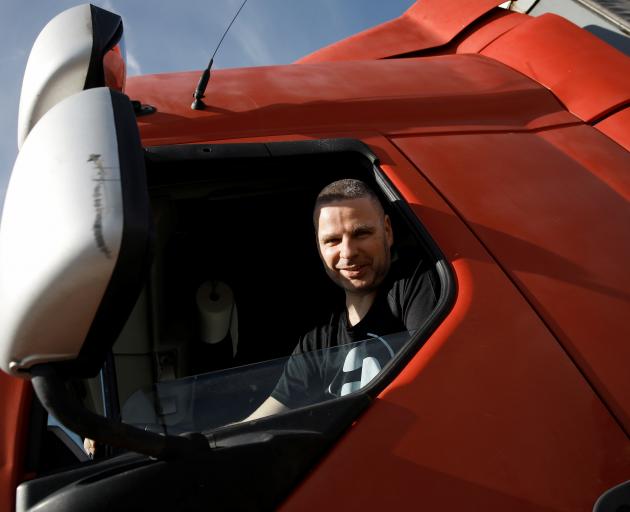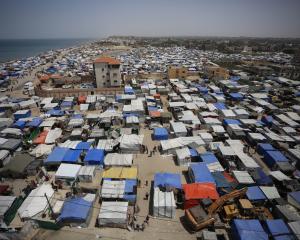British Prime Minister Boris Johnson's proposed three-month working visa for European truckers just isn't a sweet enough deal to convince Polish driver Jakub Pajka to go back to Britain. And he's not alone.
A post-Brexit shortage of truck drivers - estimated to be about 100,000 - as the Covid-19 pandemic eases has sown chaos through British supply chains in everything from food to fuel has raised the spectre of disruptions and price rises in the run-up to Christmas.
The British government on Sunday announced a plan to issue temporary visas for 5000 foreign truck drivers as a response to the acute shortfall of truck drivers that made gas station pumps run dry in cities across the country. The visas will expire on December 24.

"No thank you, Mr. Prime Minister, I will not take advantage of this opportunity. No drivers want to move for only three months just to make it easier for the British to organise their holidays," he said sitting behind a wheel of his red truck on a parking lot just outside Poland's capital Warsaw.
The additional money couldn't offset the struggle of moving countries, the threat posed by migrants trying to cross the English Channel on the back of a truck or the separation from his family, he added.
"The money you can earn in the UK does not compensate such driver for all the dangerous things that happen to him there," he said pointing to the scuffles with migrants he witnessed in ports of Calais and Dunkirk.
On a different parking lot outside of Warsaw, Jacek Rembikowski, a 60-year old truck driver with 25 years of experience, also said Brexit somewhat influenced his decision to return home after working in Britain for seven years.
Despite his thirst for adventure, and his fond memories driving from "Norway to Portugal," he says he now prefers to stay in Poland.
"(There was) an uncertainty as to how we will be treated in this situation," he said. "Whether Brexit will shake up not only the industry but also whether drivers will still be wanted."
Plans in place: Johnson
Boris Johnson sought on Wednesday to quell public fears as panic-buying left fuel pumps dry across major cities, saying the government was making preparations to ensure supply chains were ready for the run-up to Christmas.
He said the situation at gas stations was improving, though in many regions, hundreds of forecourts remained closed and motorists spent hours hunting for fuel or sat snarled in queues waiting to fill their tanks.
"We now are starting to see the situation improve. We are hearing from industry that supplies are coming back onto the forecourt in the normal way and I would just really urge everybody to go about their business in the normal way," Johnson said in televised remarks.
His comments were his first since the fuel supply problems began at the end of last week when oil companies reported difficulty transporting petrol and diesel from refineries to filling stations.
Opposition Labour leader Sir Keir Starmer accused him and the government of lurching from "crisis to crisis".
There have been growing calls for doctors, nurses and other essential workers to be given priority in filling their cars to keep hospitals and social care services running, but Johnson said it would be better if "we stabilise it in the normal way".
An air of chaos has gripped Britain, the world's fifth-largest economy, in recent weeks as a shortage of truck drivers strained supply chains and a spike in European wholesale natural gas prices tipped energy companies into bankruptcy.
The post-Brexit dearth of truckers has been exacerbated by a halt to truck-driving-licence testing during COVID lockdowns as well as people leaving the haulage industry.
It has sown chaos through supply chains and raised the spectre of widespread shortages, price increases ahead of Christmas, and a prolonged rise in inflation.
"What we want to do is make sure that we have all the preparations necessary to get through until Christmas and beyond, not just in supplying the petrol stations but all parts of our supply chain," Johnson said.
Industry groups said the worst of the fuel shortages seemed to be in London, the southeast and other English cities. Fights have broken out at some forecourts as drivers jostled for fuel and pictures on social media showed some people filling up old water bottles with fuel.
"I can't believe it - it's crazy," said David Scade, a 33-year-old delivery driver who drove for hours searching for fuel in London. "They keep saying there is no shortage but I suppose everyone is panicking now."
The Petrol Retailers Association, which represents independent fuel retailers who account for 65% of all the 8380 UK forecourts, said there were signs the crisis was abating.
"We have conducted a survey of our members this morning and only 37% of forecourts have reported being out of fuel today," said Gordon Balmer, executive director of the PRA, which had previously reported up to 90% of stations had problems.
"With regular restocks taking place, this percentage is likely to improve further over the next 24 hours."
The British Retail Consortium (BRC) urged the government to broaden the size and scope of its temporary visa scheme.
"It will take many months before there are enough new British drivers to cover the shortfall," said Andrew Opie, director of food and sustainability at the BRC.












